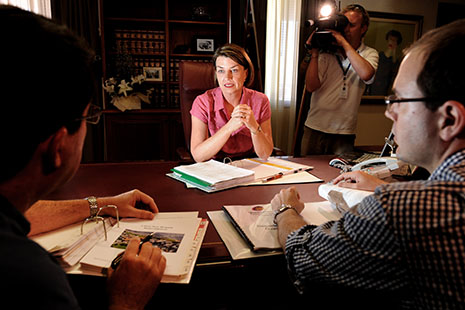ANNA BLIGH’s victory in the Queensland state election has proved an acute embarrassment to the Olympian pundits of the Australian national media. Uncritically following News Ltd’s lead, the national print and electronic media announced on election day that Bligh was facing possible defeat or a hung parliament. The Australian said she was in “a knife-edge fight for survival”; the Australian Financial Review said the election was “a cliffhanger”; the Sydney Morning Herald said it was “too close to call.”
As polling closed the ABC’s Queensland political reporter told viewers that the result could be decided by postal votes, that it could be days before the result was known, and that a hung parliament was a possibility. These words had hardly gone to air when the magnitude of the media’s misjudgement became apparent.
There had been a swing against Bligh’s Labor government, but not nearly enough to threaten its firm grip on power. Bligh was returned with a reduced but comfortable majority of some eighteen seats. Lacklustre opposition leader Lawrence Springborg made an early and gracious concession and announced his departure from the leadership.
Newspaper readers looking for some explanation of the media’s failure were hardly assisted by the Monday papers. The Australian published an article headed “How victory was seized from defeat.” It was clumsy attempted self-justification: the fact that newspapers predicted that Bligh was facing possible defeat in no way showed that she had somehow turned a loss into a victory.
Her victory was a personal and political triumph – a reality which the media seemed reluctant to acknowledge. Bligh had led Labor to a remarkable fourth successive election victory; she became the first incumbent woman premier to be elected in her own right; she had overcome the distractions of a deteriorating economy, devastating floods, a catastrophic coastal oil slick and a billionaire backing the opposition campaign.
The losers were the media. Among other things, they generally overestimated the appeal of the recent shotgun marriage of the Liberal and National Parties in Queensland; they also ignored the small but significant advantage Labor gained from last year’s Queensland redistribution (thank God for the ABC’s Antony Green). Nor, with the honorable exception of the Australian’s Tony Koch, did they understand the political importance of recent pay rises granted public servants including teachers, nurses and policemen in shoring up support for the Labor government.
But perhaps more importantly the media’s Queensland election debacle exposed two disturbing aspects of contemporary Australian political journalism. The first is the apparent spin that is put on the interpretation of events by News Limited papers; the second is the strong tendency of other media to follow their lead – especially when they have the empirical support of polls commissioned by News Limited.
News Limited political journalism is overwhelming anti-Labor in spirit and this tendency is reflected across its newspapers. So the company generally interpreted the Queensland election campaign to the disadvantage of Bligh, highlighting opposition claims that Bligh was wrong about the economy and that she was slow to react to the floods and the oil slick. These claims quickly became the orthodox narrative of the campaign and Bligh was universally judged to be “in trouble.”
The polls News Limited commissioned throughout the campaign certainly showed a swing against Labor. But the final poll put Labor behind in the two-party preferred vote by an insignificant 49.9 per cent to 50.1 per cent. The accompanying report in the Australian commented: “If the five percentage point swing since the last election was replicated uniformly across Queensland Labor would lose thirteen of the seats it is notionally deemed to hold after a recent redistribution. On that basis Ms Bligh would be left with a five-seat majority in parliament”.
Nevertheless the headline declared Bligh in a knife-edge fight for survival and the rest of the media, lacking polls of their own, echoed News Limited’s line, reinforcing the perception that Bligh was in deep trouble facing possible defeat or a hung parliament.
What the News Limited poll report ignored was Antony Green’s point that since the redistribution it was going to take a swing of 7.6 per cent to take eighteen seats from Labor and give victory to the Opposition. A uniform five per cent swing would not be enough.
In fact the News Limited poll was wide of the mark: the swing against Labor was 4.3 per cent and Ms Bligh was left with an eighteen-seat majority. She lost six seats and the LNP gained seven, leaving Labor holding fifty-two seats to the LNP’s thirty-three. Despite the News Limited spin that the election was too close to call and that Springborg was in with a chance, the facts were that it was not too close to call and that Springborg was never a serious chance.
Nevertheless the rest of the national media followed the News Limited line and echoed its frankly self-serving and misleading analysis. It was a dismal performance all round.
In the Australian’s unapologetic coverage of the election result it was hard to find any reference to the fact that mid-campaign, in a masterly distraction, a News Limited tabloid rushed into print with what it claimed were raunchy pictures of One Nation candidate Pauline Hanson in the 1970s. In small print at the bottom of page eight there was a passing acknowledgement that the claim was “erroneous” (although the offending newspaper had published a belated apology to Ms Hanson).
For a newspaper that delights in highlighting the swineries of other newspaper groups it was a strange, small and grudging confession that spoke volumes about the standards of care, accuracy and ethics in News Limited journalism. •




